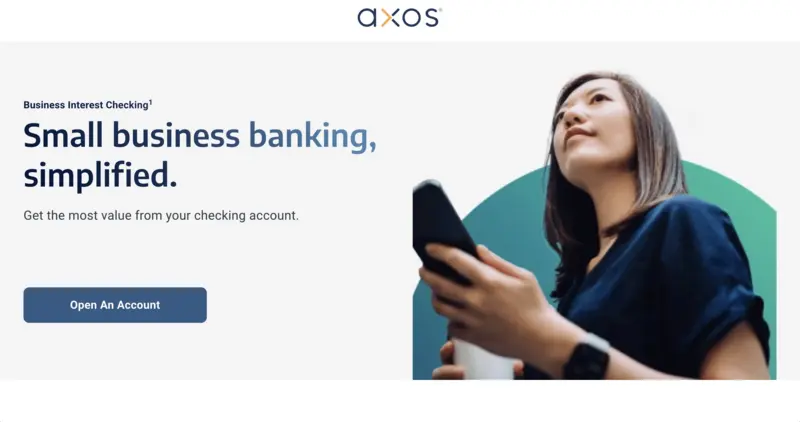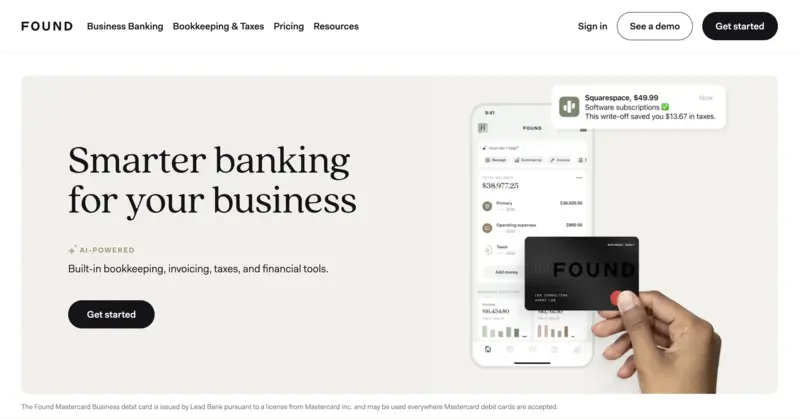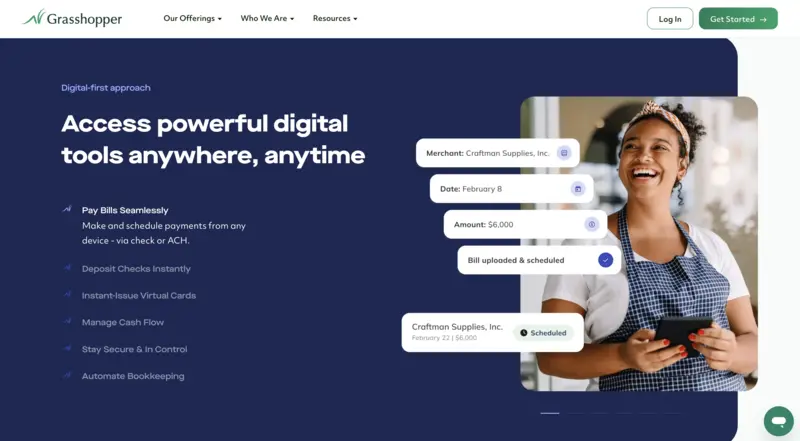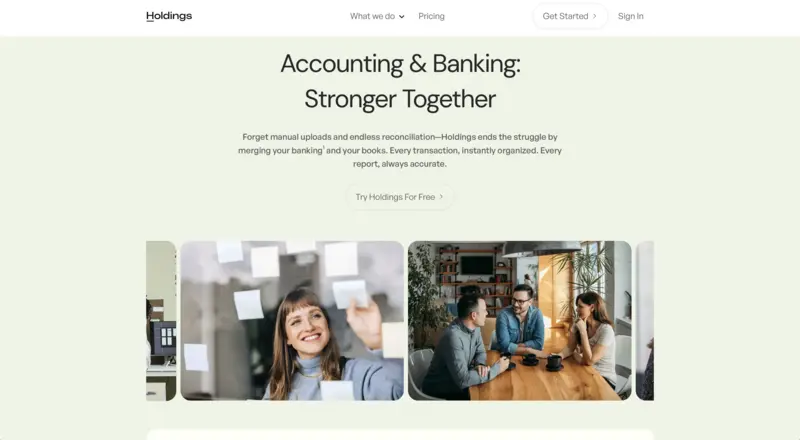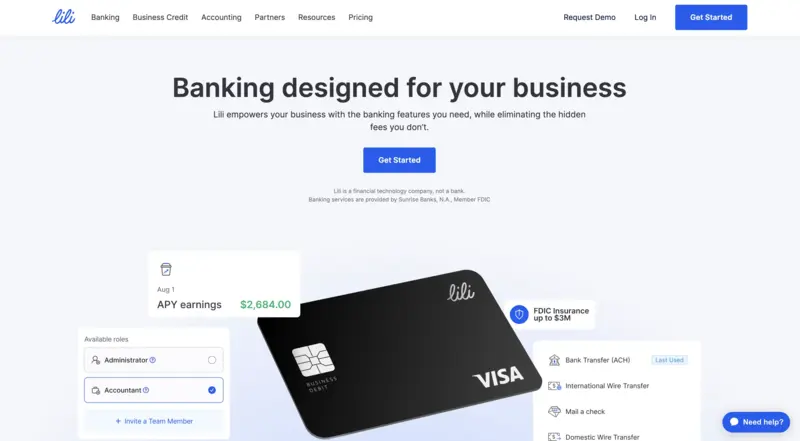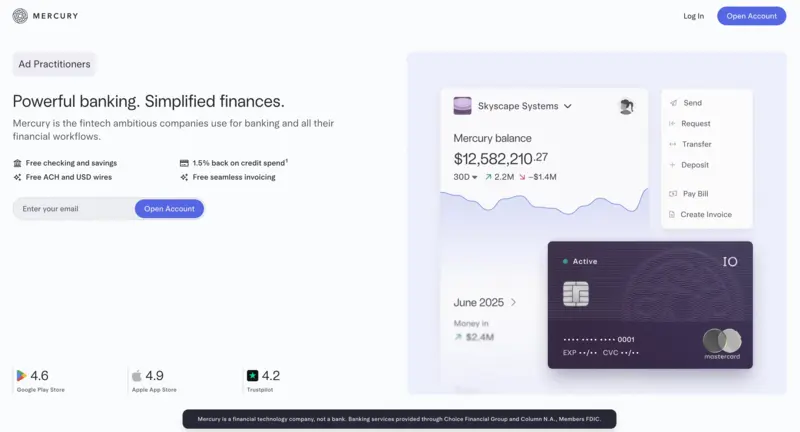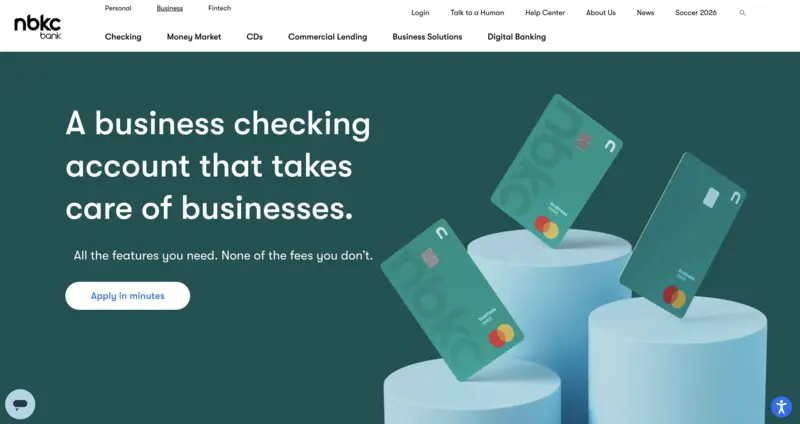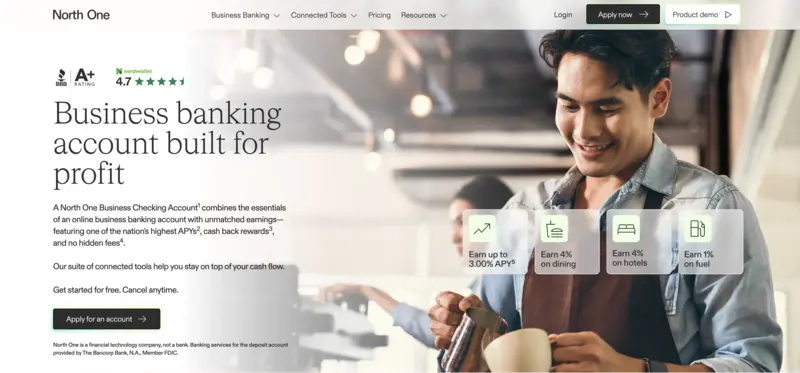Best Business Checking Accounts
Based on In-Depth Reviews
- 200+Hours of research
- 20+Sources used
- 20Companies vetted
- 3Research Criteria
- 4Top
Picks

- Business checking accounts don’t vary much from bank to bank
- Monthly fees won’t tell you much about what you’ll end up paying
- More account features means fewer extra fees for you
- Choose accounts that fit your business needs
How we analyzed the best Business Checking Accounts
Our list of the best Business Checking Accounts
- Additional Companies:
- Found
- Grasshopper Bank
- usbankplatinum
- grasshopper-business-saving
- usbank-business-essentials
- holdings
- Grasshopper Business Checking Accounts
- Chase Business Complete Banking
- BB&T Bank
- BBVA
- Capital One
- PNC Bank
- U.S. Bank
- First Bank
- Huntington Business Checking
- Small Business Bank
- NorthOne
- Nearside
- Citizens Bank Business Checking Accounts
- U.S. Bank Gold
Relay Disclaimers:
*Relay is a financial technology company and is not a bank. Bank services provided by Thread Bank, Member FDIC. Relay’s Visa credit card is issued by Thread Bank, Member FDIC, pursuant a license from VISA U.S.A., Inc. and may be used anywhere Visa is accepted. Terms and conditions apply to the cash back rewards program. Monthly cash back rewards will be automatically deposited into your Relay checking account within 30 days of the end of the credit card billing cycle. ATM transactions, the purchase of money orders or cash equivalents made with your Relay Visa®️ Credit Card are not eligible for cash back. Please refer to the Visa®️Signature Rewards Program Terms & Conditions for more details.
1For Relay Subscription Plans with an interest-bearing deposit account, the interest rate and Annual Percentage Yield on your account are accurate as of 10/30/2025 and are variable and subject to change based on the target range of the Federal Funds rate. Fees may reduce earnings:
When you are subscribed to the Starter Plan, the interest rate on your savings accounts is 0.91% with an APY of 0.91%.
When you are subscribed to the Grow Plan, the interest rate on your savings accounts is 1.53% with an APY of 1.55%.
When you are subscribed to the Scale Plan, the interest rate on your savings accounts is 2.65% with an APY of 2.68%.
Mercury Disclaimers:
*Mercury is a financial technology company, not a bank. Banking services provided through Choice Financial Group, Column N.A., and Evolve Bank & Trust; Members FDIC. See Mercury’s Customer Referral Agreement for full terms and conditions of offer by visiting https://mercury.com/legal/referrals.
1The IO Card is issued by Patriot Bank, Member FDIC, pursuant to a license from Mastercard®. Cashback is automatically credited to your linked checking account when your monthly repayment is processed. If you make an early payment (full or partial), you’ll receive cashback proportional to the amount paid. Your Mercury accounts must be open and in good standing to receive cashback. Cashback rewards may be forfeited if your account is closed or pending closure based on a violation of any applicable terms. Mercury may modify or terminate the cashback program at any time, and any promotional offers or other changes will be communicated by email or on our website. If you have questions about your cashback, please contact Mercury at help@mercury.com.
2Mercury Treasury, offered by Mercury Advisory, LLC, an SEC-registered investment adviser, seeks to earn net returns up to 4.09% annually on your idle cash. Net return or yield provided assumes total Mercury deposits of $20M+, is accurate as of 09/29/2025, and is subject to change. This communication does not constitute an offer to sell or the solicitation of any offer to purchase any security. Funds in Mercury Treasury are subject to investment risks, including possible loss of the principal invested, and past performance is not indicative of future results. Some of the data contained in this message was obtained from sources believed to be accurate but has not been independently verified. Please see full disclosures at mercury.com/treasury. Mercury Advisory is a wholly-owned subsidiary of Mercury Technologies. Mercury Treasury is not insured by the FDIC. Funds in Mercury Treasury are not deposits or other obligations of Choice Financial Group, Column N.A., or Evolve Bank & Trust, and are not guaranteed by Choice Financial Group, Column N.A., or Evolve Bank & Trust.
Grasshopper Bank Disclaimers:
1Innovator Business Checking Annual Percentage Yield (APY) is accurate as of 9/26/2025. The minimum amount to open an account is $100.00. Rate tiers are as follows: 1.00% APY applies to balances of $0.01—$24,999.99. 1.55% APY applies to balances of $25,000-$250,000.00. 1.00 APY applies to balances of $250,000.01 and above. Rates may change after the account is opened. Fees may reduce earnings. National average interest rate for interest checking is 0.07% APY – source: www.fdic.gov.
1Innovator Money Marketing Savings Annual Percentage Yield (APY) is accurate as of 9/26/2025. The minimum amount to open an account is $100.00. Rate tiers are as follows: 1.80% APY applies to balances of $0.01—$24,999.99. 3.30% APY applies to balances of $25,000 and up. Rates may change after the account is opened. Fees may reduce earnings.
2Cash Back rewards offer 1.00% cash-back on all Qualified Purchases made by eligible Innovator Business Checking account holders. To qualify for the Cash Back reward of 1.00% cash-back in an Innovator Business Checking account, account holders must meet all requirements and a transaction must be deemed as a Qualified Purchase. Clients are required to maintain an average balance of $10,000 or more within the calendar month in their Innovator Business Checking account and the account must remain open, active, and in good standing to participate in the program, meaning: No NSF (non-sufficient funds) items during the preceding twelve calendar months. Grasshopper Bank reserves the right to modify the description of “good standing” at any time.
Qualified Purchases are signature-based purchases made with a Debit Card from an Innovator Business Checking Account. To make a signature-based purchase, select “credit” rather than debit at point-of-sale kiosks. The “credit” option is most often pre-selected when making purchases online using a debit card. Online subscription payments may not be considered signature-based purchases. The payment transaction type (signature-based or other) is ultimately decided by the merchant and how the transaction is transmitted to Grasshopper Bank at the time of processing. We reserve the right to determine if a transaction was a Qualified Purchase, and to establish additional types of Qualified Purchases that could be made available in a variety of ways. Any goods or services purchased with the Debit Card issued by Grasshopper Bank that are returned or otherwise credited to the account are not qualified purchases. Unlawful purchases and purchases of currency, cash or cash equivalents (including, without limitation, currency from the U.S. Mint, Travelers Cheques, gift cards, Cryptocurrency, Casino Chips, Peer to Peer Payments, prepaid debit cards, account openings, loan payments, or other cash equivalents) made with a Debit Card issued by Grasshopper Bank are not Qualified Purchases. We may require documentation to validate that certain purchases are Qualified Purchases. If you or the Bank closes the account for any reason before the end of the statement cycle, you will forfeit all rewards accrued through your linked Debit Card during that statement cycle.
Important Tax Information
The value of this reward may constitute taxable income and may be reported to the Internal Revenue Service as miscellaneous income to the first signer on the account, in the year received, as required by applicable law. Offer is limited to clients who are citizens of the United States that furnish or have a valid Form W-9 on file and the account must not be subject to backup withholding. You may be issued an Internal Revenue Service Form 1099 (or other appropriate form) to you that reflects the value of such reward. Please consult your tax adviser, as Grasshopper Bank does not provide tax advice.
Found Disclaimers:
Found is a financial technology company, not a bank. Banking services are provided by Lead Bank, Member FDIC.
*Optional subscription to Found Plus for $19.99/month or $149.99/year. There are no monthly account maintenance fees, but other fees such as transactional fees for wires, instant transfers, and ATM apply. Read more.
Lili Disclaimers:
1The Annual Percentage Yield (“APY”) for the Lili Savings Account is variable and may change at any time. The disclosed APY is effective as of January 1, 2025. Must have at least $0.01 in savings to earn interest. The APY applies to balances of up to and including $1,000,000. Any portions of a balance over $1,000,000 will not earn interest or have a yield. Available to Lili Pro, Lili Smart, and Lili Premium account holders only; applicable monthly account fees apply.
BlueVine Disclaimers:
1Premier and Plus plan customers automatically earn annual percentage yield ("APY") on their available balances. Standard plan customers will earn interest on their available balances if they meet an eligibility requirement as detailed in the Terms of Interest Accrual which is incorporated as a part of the Bluevine Business Checking Account Agreement.
US Bank Disclaimers:
Offer:
- Open, and be approved for, a new U.S. Bank Payment Solutions Merchant Account (MID) by March 31, 2026.
- Process $5,000 in transactions within 60 days of approval.
- Keep the approved account in an open status and be actively accepting and settling card payments at the time the statement credit is issued.
Disclosure:
Promotional offer is available with establishment of a new payment processing account by new or existing U.S. Bank customers, not currently using Elavon as their merchant processing services provider. Offer may not be combined with any other Merchant Services promotions or incentives. Association Partners, registered Payment Facilitators, and certain other business types with specialized pricing are not eligible for this offer. To qualify you must:
• Open, and be approved for, a new U.S. Bank Payment Solutions Merchant Account (MID) by March 31, 2026.
• Account must be open and actively accepting and settling payments at the time the monthly statement credits are being calculated and applied in order to receive the rebate. Merchant account must be in good standing with no outstanding recovery balance.
Open a new U.S. Bank Payment Solutions merchant account before March 31, 2026, process at least $5,000 in net settled transactions within 60 days of approval and receive a $400 statement credit. Credit is applied within 60 days after reaching $5,000, provided your account remains open, active, and in good standing with no outstanding recovery balance. Limit one credit per Merchant ID; offer valid for U.S. merchants only. Available to new payment processing accounts for customers not currently using U.S. Bank and/or Elavon (a U.S. Bank company) for merchant processing. Cannot be combined with other promotions. Certain business types, Association Partners, Business Essentials customers and registered Payment Facilitators are ineligible. U.S. Bank may modify or end this offer at any time; additional restrictions may apply.
Deposit products are offered by U.S. Bank National Association. Member FDIC. 2026 U.S. Bank
Our Top Picks: Business Checking Accounts Reviews
This site does not include all companies or all available offers. Companies listed below are listed in alphabetical order.
Axos Bank Business Account Overview
Axos Bank offers digital business checking options tailored for small businesses and startups seeking flexible, modern banking. With the Business Interest Checking account you can earn interest on balances, use debit cards, access unlimited domestic ATM fee reimbursements, and manage your account entirely online.
Fees & Requirements
The Business Interest Checking account has a $10 monthly maintenance fee which is waived if you maintain a $5,000 average daily balance. Opening the account requires a minimum deposit, and you must stay under certain transaction limits before extra charges apply. Deposits are FDIC insured, and there are unlimited domestic ATM fee reimbursements. There are monthly free transaction limits before per-item fees.
Perks & Benefits
Key perks include the ability to earn up to about 1.01% APY on balances (for certain tiers), unlimited domestic ATM fee reimbursements, 50 free checks at account opening, and integration with accounting tools like QuickBooks. The digital-only model offers strong online access, and the bank also provides enterprise-level business banking services for companies that scale.
Bluevine Business Account Overview
Bluevine offers an online business checking account designed for small business owners who want flexible, modern banking. Manage deposits, payments, and sub-accounts in one dashboard, issue multiple debit cards, and enjoy unlimited transactions on desktop or mobile. It’s built to simplify cash flow management and daily operations.
Fees & Requirements
Bluevine has no monthly fees, overdraft charges, or minimum balance requirements. You can open an account online with no credit check, and standard ACH transfers are free. Deposits are FDIC insured up to $3 million through partner banks. Interest can be earned by meeting simple monthly activity requirements like card spending or receiving payments.
Perks & Benefits
Bluevine offers competitive yields—up to 1.3% APY on balances up to $250,000 with the Standard plan and up to 3% APY with upgraded plans. You can create sub-accounts for budgeting, automate transfers, and send payment links directly from your account. The platform integrates with QuickBooks and Xero, provides free access to 37,000+ MoneyPass® ATMs, and includes team spending controls and priority support for higher-tier users.
Best for Brick and Mortar Fans
While modern banking is increasingly focused on internet and app experiences, there are some who prefer the ability to simply walk into a bank and speak with a live human being. This is not to suggest that Chase is running some kind of throwback Luddite operation lit by whale oil lanterns--the bank sports the same full range of recognizable, modern, online tools as its competitors. You can open a Chase Business Complete account quickly and easily online. But with nearly 4,700 branches in 29 states and the District of Columbia, there’s a good chance that if you’re reading this, you’re one of the 80% of Americans with a Chase bank close by in your state.
Chase gets the highest marks for customer service on Consumer Reports of any of the megabanks--though it should be noted that smaller, local banks consistently score higher in terms of customer service than larger banks. The major trade-off between big banks and local options is between the technological and security resources that come with a large institution and the personal touch that you get from your friendly neighborhood banker. If you prefer going local, by all means do so. Obviously, we haven’t investigated every small bank in every municipality in the country, so make sure to educate yourself before shopping around.
Chase Business Complete Checking comes with $15 monthly fee, which is on the lower end of the price spectrum, with various ways to waive. Plus, you’ll have access to over 16,000 Chase ATMs throughout the country. Bear in mind there is a $3 non-Chase ATM fee, and an insufficient funds fee of $34 (though there are several ways to waive the latter). The account also gives customers the option of purchasing a payment solution called QuickAcceptSM which allows customers to accept debit and credit card payments via swipe, dip, and tap methods. Having an integrated payment solution can simplify accounting and gives your customers the flexibility to pay in the way that's most convenient for them. The feature is integrated into the Chase mobile app and costs $49.95. Per-transaction fees also apply.
Best for Incentives
First Bank offers a strong line up of accounts for multiple sizes of business in its own right, including an analysis account and an admittedly bare bones Community Checking account for nonprofits. Where First Bank shines though is in its One Rewards Program--one of very few credit card-style rewards programs offered for business checking accounts that we found.
One Rewards can be tied to either a business debit or credit card. The program offers points toward cash back, travel, gift cards for major and minor brands, and direct merchandise purchases through First Bank. These last can range from common household items like batteries, automotive tool sets, and kitchen items to jewelry, DVDs and video games, and even a pooper scooper for you dog. The One Rewards minisite offers a points calculator to estimate how much you’ll earn annually based on different types of purchases.
The accounts offered are on par with those of other banks in the same or similar tiers. Fee waivers require higher balances or other criteria, but monthly fees are on the low side and transaction limits are quite generous. The one major demerit is all the extra fees the bank charges for everything from wire transfers, stop payments, and night deposits to faxes and out of network ATM charges. While it is rather refreshing that First Bank is far more upfront about these costs than other banks--which tend to hide fee schedules in the far, unexplored reaches of their websites--the sheer quantity of additional fees is disappointing.
Found Business Account Overview
Found is an online business checking account built for freelancers and self-employed professionals who want simple, all-in-one money management. It combines banking, bookkeeping, and tax tools so users can track income, send invoices, and manage expenses from one dashboard. You can open an account in minutes, create virtual cards, and set aside funds for taxes or savings using customizable “Pockets.”
Fees & Requirements
Found has no monthly fees, overdraft charges, or minimum balance requirements. ACH transfers are free, and no credit check is required to open an account. Deposits are FDIC insured up to $250,000 through Found’s partner bank. Users can upgrade to Found Plus for $19.99 per month or $149.99 per year to access enhanced features and higher transfer limits.
Perks & Benefits
Found simplifies business finances with built-in bookkeeping and tax tools that automatically categorize expenses, estimate taxes, and generate a Schedule C. Users can send unlimited invoices, pay contractors, capture receipts, and connect payment apps like PayPal, Venmo, and Square. Found also offers early direct deposit access, smart virtual cards with spend controls, and automation tools to help self-employed professionals stay organized and tax-ready.
Grasshopper Business Account Overview
Grasshopper offers a fully digital business checking account designed for startups and small businesses that want modern, easy-to-manage banking. You can handle deposits, payments, and card spending all from one platform, with both physical and virtual debit cards and integrations that connect seamlessly to popular accounting tools.
Fees & Requirements
Grasshopper has no monthly maintenance fees, no transaction limits, and no minimum balance requirements after account opening. Accounts can be opened online with a small initial deposit, and incoming ACH and domestic wire transfers are free. Deposits are FDIC insured up to the standard limit through Grasshopper Bank, N.A., Member FDIC.
Perks & Benefits
Grasshopper offers 1% cash back on eligible debit card purchases and pays interest on qualifying balances. The account includes free bill pay, mobile check deposit, and invoicing features, plus advanced card controls and multi-user access. With integrations for bookkeeping and easy expense tracking, Grasshopper helps small business owners manage cash flow efficiently and securely.
Holdings Business Account Overview
Holdings is a digital-first business banking platform that combines high-yield deposits, cash management, and accounting tools in one place. Built for small businesses and entrepreneurs, it offers unlimited transactions, virtual debit cards, and a unified dashboard for managing cash flow, invoices, and expenses.
Fees & Requirements
Holdings has no monthly maintenance fees, no minimum balance requirements, and no fees for ACH or wire transfers. Accounts can be opened online and are backed by FDIC-insured partner banks, with coverage of up to $3 million through a sweep network. Eligible balances can earn up to 3.0% APY, depending on tier and plan type.
Perks & Benefits
Holdings offers integrated bookkeeping, automated expense tracking, and seamless connections to leading accounting platforms. Users can create and manage invoices, schedule payments, and organize finances directly within the platform. With high-yield savings, fee-free banking, and comprehensive financial tools, Holdings simplifies business banking for growth-focused companies.
Lili Business Account Overview
Lili's business checking account is crafted for small business owners who want integrated banking, tax, and expense tools. You can open an account quickly, manage income and expenses from one app, issue a business debit card, and set aside funds for tax obligations using built-in “Buckets.”
Fees & Requirements
Lili’s Basic plan has no monthly fee, no minimum balance, and no credit check required to open an account. ACH transfers are free, and deposits are FDIC insured through a partner bank. Optional premium plans unlock additional tools for a monthly or annual subscription fee.
Perks & Benefits
Lili stands out with its expense categorization, automated tax savings, invoice tools, and business credit building program. You’ll receive direct deposits up to two days early, access fee-free ATM withdrawals via a large network, and benefit from international wire capability on certain plans—all within a streamlined digital platform designed for solo-business operators.
Mercury Business Account Overview
Mercury offers online business checking and savings accounts designed for startups and small businesses that value speed, transparency, and modern tools. You can manage deposits, payments, and transfers in one dashboard, issue virtual and physical debit cards, and grant controlled access to team members. The platform integrates with tools like QuickBooks, Xero, Stripe, and PayPal for streamlined financial management.
Fees & Requirements
Mercury has no monthly fees, overdraft charges, or minimum balance requirements. ACH transfers and domestic wires are free, and there are no limits on standard transactions. Accounts can be opened entirely online in minutes, and deposits are held with FDIC-insured partner banks, eligible for up to $5 million in coverage through a sweep program.
Perks & Benefits
Mercury provides advanced tools like automated transfers, bill pay, and virtual cards with spending controls. Businesses can manage multiple users, customize permissions, and use built-in integrations to sync data across accounting and payment platforms. The platform also offers treasury options for earning yield on idle funds and access to resources such as investor connections and venture financing tools.
nbkc Bank Business Checking Account Overview
nbkc Bank offers an online business checking account designed for small businesses seeking straightforward, flexible banking. You can open an account online, use a physical or virtual debit card, and manage deposits, payments, and transfers via mobile or desktop—all within one account.
Fees & Requirements
nbkc Bank’s business checking account carries **no monthly maintenance fee** and requires no minimum balance. Domestic ACH and most deposit services incur no extra fees; certain cash services or special wires may have standard per-item charges. The account can be opened online in a few minutes, and deposits are FDIC insured through nbkc Bank, Member FDIC.
Perks & Benefits
The account includes unlimited transactions at no additional cost, which is especially helpful for businesses with varying payment volumes. You’ll receive free standard ACH transfers, enjoy access to mobile check deposit and remote banking tools, and benefit from online account opening.
NorthOne Business Account Overview
NorthOne is an online business checking account built for freelancers, startups, and small business owners looking for streamlined digital banking. It offers a mobile-first experience with features like unlimited “Envelopes” to segment funds for taxes, payroll or rent, integrations with payment platforms (Stripe, PayPal, Shopify) and accounting tools, and physical or virtual debit cards issued for your team.
Fees & Requirements
The Standard account charges a monthly fee (around $10), with no minimum balance or monthly maintenance fee beyond that. ACH deposits and standard transfers are included, while same-day ACH and wire transfers may carry fees or require an upgraded plan. Accounts are opened online, generally in minutes, and deposits are FDIC-insured through partner bank arrangements.
Perks & Benefits
NorthOne offers unlimited transactions, including deposits, transfers and purchases, all without incremental charges on the base plan. It supports real-time syncing with many business apps, allows you to set auto-rules to funnel money into various Envelopes, and offers a large nationwide ATM and cash-deposit network via partnerships.
Best Bank to Grow With
Most banks offer at least two tiers of business checking accounts to cater to enterprises of different sizes. PNC offers four tiers plus additional à la carte “checking solutions.” This means you can keep the same bank while you work your way up from a business you run off of your dining room table, to your garage, to having your own building with the name of your business proudly displayed on the facade in ten ten foot letters.
More options means a better likelihood of finding the right scale for your business needs. In addition to a Non-Profit Checking account boasting stats that are fairly standard for the industry, PNC offers higher end products for larger businesses. These include interest bearing accounts, an analysis account, and even a sweep account for medium to large businesses. Sweep accounts combine regular cash management with flexible investment options where the account balance is “swept” overnight into investments and then returned to cash in the morning. Such accounts presuppose larger balances as well as larger risk tolerances than are typical of small businesses.

In addition to business checking accounts, PNC offers discounts on loans to existing PNC account holders. Small business loans and lines of credit will help you grow or upgrade your business. Used in conjunction with the “checking solutions” extras and the appropriately-tiered checking account for your business size, PNC provides an impressive arsenal in your battle to build your business.
Relay Business Account Overview
Relay is an online business banking platform built to give small business owners greater visibility and control over their finances. Users can open up to 20 checking accounts and 2 savings accounts, issue physical or virtual debit cards, and manage all business payments and deposits—including ACH, wires, checks, and transfers from platforms like PayPal and Stripe—through one dashboard.
Fees & Requirements
Relay has no monthly fees, overdraft charges, or minimum balance requirements. Accounts can be opened online with no credit check. The platform offers a free plan and optional paid tiers with added features like same-day ACH and higher savings rates. Banking services are provided by Thread Bank, Member FDIC, with deposits eligible for up to $3 million in FDIC insurance through a partner sweep program.
Perks & Benefits
Relay offers flexible tools to simplify cash management. You can automate transfers between accounts, set spending rules for team cards, and manage user permissions. Savings accounts earn up to 2.86% APY, and integrations with QuickBooks, Xero, Gusto, and Plaid help streamline accounting. Additional features include bill pay, receipt tracking, and real-time cash flow insights.

More insight into our methodology
Total Fees
Most business checking accounts charge monthly service fees, but these may be waived if you maintain a balance over a certain amount. The service fee and the minimum balance required to avoid it vary by bank.
Some banks also impose restrictions on how many transactions you can have each month. If you exceed this number, it'll charge you a small fee per additional transaction. Restrictions may be on transactions as a whole or on specific types of transactions, like cash deposits or wire transfers. If your business does a lot of transactions each month, it's crucial that you choose a business checking account that allows for unlimited free transactions.
Account Features
The size of an account’s fees don’t matter much if the account offers little in the way of features. If all you’re allowed to do is write and cash paper checks, you need to look elsewhere. Modern businesses need multiple flexible methods for making and receiving both electronic and physical payments.
Along with monthly maintenance fees, transaction limits and minimum balance requirements are the headline features of almost every business checking account. Though high limits and low balances are certainly more desirable than vice versa, they don’t tell the full story.
User Experience
While it’s true that modern banking is increasingly done online, some consumers still prefer to conduct business in person. Neither option is necessarily better than the other since it amounts to a simple matter of preference, but if a bank claims to be the number-one internet bank, it should have the site and app to prove it. Conversely, if a bank’s sales line is that it has the best in-person service with the most locations, it had better deliver on that promise.
Helpful information about Business Checking Accounts
It’s worth noting that the term “business checking” is a bit of a misnomer. The lines between checking, savings, and other types of accounts have blurred greatly in recent years as banking customers embrace online services more and more. The classic model of a single-purpose checking account where you write and mail checks and then wait for them to clear is largely a thing of the past.
To get a sense of how far “business checking” accounts have come from their origins, we talked to Jill Wersell, owner of Wersell’s Bike & Ski Shop in Toledo, Ohio--a family business started back in 1945. Interestingly, the bike shop’s checking account predates her tenure as owner, which started in 1983. You might think a 74 year old business would do things the old fashioned way, but you’d be wrong. Nowadays, Jill does most of her banking online and can’t remember the last time she wrote a check. “99% of everything is just done online in the banking world,” she told us. “Pretty much the only reason I go to a bank nowadays, to be honest with you, is to get change.”

Photo by Jill Wersell
Today’s business checking accounts can include traditional checking, online banking and transfers, linked credit cards, and account analysis, among other features. Some even accrue interest on balances, though not nearly at the rate of dedicated savings accounts. The familiar term “business checking” is still used by most banks providing these services and is the name we’ll be using throughout this article. However, the nature of the accounts themselves has changed with the times.
When we began researching business checking, we were surprised by how similar accounts are from bank to bank. No one ever claimed that banking is the most exciting industry in the world, but the degree to which banks don’t attempt to differentiate their products is confusing, frankly. Generally speaking, fees, transaction limits, and other specifics of accounts within the same class didn’t differ all that much across banks. If anything, the choice of stock photo images of happy professionals conducting business was the primary difference from site to site.

We decided, then, that for this topic, we’d need to dig a little deeper than the advertised features. If, indeed, there is any real difference between these accounts--something that separates the good from the bad--we knew we couldn’t rely on the marquee features. Beyond simply reading the fine print, we’d have to read between the lines to get at the truth.
Why Business Checking?
For the small business owner just starting out, a separate checking account may seem a little silly. After all, if you have no employees other than yourself, and your global headquarters is in your garage next to the laundry machines, what’s the point of opening a new, separate account? Besides, for the most part, business checking accounts are more expensive than personal accounts. Why take on the extra expense right when you need to be leveraging every cent you have?
The answer comes down to one word: liability.

Mega Financial Conglomerate LLC Global Headquarters
While sole proprietor businesses aren’t legally mandated to have a business checking account, it’s not a bad idea to get one anyway. Operating a business opens one up to a wide range of risks both legal and financial. A business account insulates the owners and operators of a business from some of these risks. It also provides fledgling enterprises with useful performance indicators such as the ability to gauge and improve efficiency as well as the professional credibility that comes with rigorous accounting procedures and branding. After all, paying for something with a check in your business’s name looks far more legitimate than using your personal account.
When we asked Ken Zuercher, founder and owner of Zuercher Amplification, which makes and sells classic tube-driven amplifiers for electric guitars--coincidentally also in Toledo, Ohio--why he opened his business account, he told us that “it was for tax purposes. I found myself spending too much time trying to keep the business taxes for the business income and my family income separate.”

Photo by Ken Zuercher
When a business exists as a separate legal entity from its owner(s) (e.g., as a corporation or an LLC), a separate business account is required. For one thing, accounting and reporting requirements for business taxes are more complicated and strict than they are in the personal sphere. If you accidentally claim a business expense as a personal expense--or vice versa--because your personal and business assets are commingled, you may be opening yourself up to charges of tax fraud or an audit of yourself and your business. These are headaches you certainly don’t need.
Lawsuits are another liability you want to protect yourself from. If someone hurts themselves with your product or on your business property, or sues for some kind of intellectual property infringement, you need to be personally protected. While it’s unfortunate that your business could go under if a lawsuit doesn’t go your way, know that a business account acts as a firewall, lessening the risk to your personal assets. If they’re intermingled, asset seizures won’t stop with your business. They could include personal holdings, your car, and even your house.
According to the Small Business Administration, just over 20% of new businesses fail within their first year of operation, and only half survive five years. These numbers are not meant to discourage, but rather to illustrate how difficult it is to successfully get a new business off the ground. Businesses, regardless of how new or old they are, fail for all kinds of reasons. You may have the best product or service, but a million things could go wrong. Keeping a bit of daylight between your personal money and that of your business will prevent business risks from becoming personal risks.
Businesses with multiple owners, in particular, should welcome the risk mitigation a shared business account affords. At the very least, such an account might just save your friendship with your business partners. Think of it as a form of relationship insurance.
What’s the Difference Between Personal and Business Checking?
The difference between personal and business checking is, strictly speaking, not much. Business and personal checking accounts operate in much the same manner (remembering, of course, that modern accounts are often hybrids). The only real differences between the two are in fees and the sign up process, which requires more documents for a business account.
Business accounts usually have higher fees than their personal counterparts and require larger minimum balances. These balances tie up funds that could otherwise be used to grow the business and can seem pretty onerous to the small business owner. And while we sympathize with that, the choice of checking account shouldn’t hinge on lower balance minimums, particularly if such a choice results in disproportionately inflated expenses due to other, hidden fees. Suffice it to say, what sounds good in the account manager's office is not a full accounting of the costs you can expect to incur.
 It also may make sense, depending on your business model, to open a business savings account instead of--or in conjunction with--a checking account. Your money will be working a little harder for you if you can afford to let it sit, and have limited monthly transaction needs.
It also may make sense, depending on your business model, to open a business savings account instead of--or in conjunction with--a checking account. Your money will be working a little harder for you if you can afford to let it sit, and have limited monthly transaction needs.
Finally, it’s worth noting that a check written from a business account will have the name and address of your business on it in place of your personal information. This small nod to professionalism will not go unnoticed--personal checks, on the other hand, scream “amateur hour.” Make no mistake, it’s not a good look when you’re trying to prove the legitimacy of your new business.
All These Accounts Look the Same. How Do I Choose?
Spend a few minutes researching different business checking accounts and you’ll notice that most of them appear to be very similar. Even the promotional materials banks use usually touch on the same three points: monthly fee and how to avoid it, transaction limit, and minimum balance needed to open the account. That most banks don’t put much effort into promoting this product is interesting considering there are currently around 30 million small businesses in America and almost a half a million new ones are started every year. It might be that the high failure rate of new businesses dissuades banks from aggressively pursuing this market. In any event, these three criteria are a poor way to accurately judge the promoted accounts.
We spoke to William F., a VP in commercial banking for a large regional bank in the Northeast about why banks don’t try to differentiate their business checking accounts more. He told us that “a checking account is a bedrock product for anyone from an estate to a business to you and me. We all need a place to ‘put’ the money we get and a method to ‘pay’ for stuff… ...the checking account is a ground floor product from which a larger banking relationship can be built upon.” As a “bedrock” product, then, banks purposely build and market a time-tested, fairly standardized offering.
The best way to judge them, as we’ve previously mentioned, is to read between the lines. While a low or no fee option seems like a no-brainer, those accounts typically allow for fewer monthly transfers, or have other restrictions and hidden fees. If you repeatedly go over the transfer limit, overdraft, or find yourself paying ATM or check cashing fees, you might discover that your “low fee” account could have you paying much more than higher end accounts. This is not to suggest we’re advocating an account on a higher tier--it is not our job to upsell you. What we mean to say is that it’s important to choose an account that works for your particular business needs.
Do the math--estimate your business’s monthly needs and choose the account that best fits that criteria. As with so many other products, the cheapest business checking account is not always the best. Nor is the most expensive account.
What Counts as a Transaction?
This is an excellent question, and is a bit more complicated than the simple number of checks you have going in and out of your business. In short, the transaction total includes the checks mentioned, plus ACH credits and debits, and all online transfers and debit card transactions. While none of these alone might amount to that much, when combined, they add up quickly.
 Let’s say, for example, that you have a little business selling Whozits. Your monthly payroll is four employees, including yourself. Payroll software is typically too expensive for businesses of this size--usually you’ll pay a flat monthly rate depending on features, plus a surcharge for each employee--so you’re writing out these paychecks yourself.
Let’s say, for example, that you have a little business selling Whozits. Your monthly payroll is four employees, including yourself. Payroll software is typically too expensive for businesses of this size--usually you’ll pay a flat monthly rate depending on features, plus a surcharge for each employee--so you’re writing out these paychecks yourself.
Your business operates out of a small storefront you rent, the cost of which is also paid by check every month. Utilities--electricity, water, and internet--are not included in the rent, and you pay them online using an automated, recurring payment. Meanwhile, your Whozit supplier invoices biweekly to keep you flush with stock. Whozits, it would appear, are a very popular product.
Count it up--that’s already ten transactions right there. This doesn’t account for any incoming transactions (Whozit sales, investments your friends might have made into your fledgeling company, or transfers from an outside savings account) or unexpected expenses (buying lunch for your team when they exceeded productivity goals, or paying a plumber to fix a leak in the office kitchen). Even a very small business can expect a fairly large number of transactions a month. It may be worth it to skip the account with a transaction cap of 50 and go to the next account tier.
Why Should I Care About the Minimum Balance?
Business checking accounts are really only for small businesses. Apple’s Tim Cook, for instance will not be reading this article to decide what to do with his company’s reported Q1 2019 pile of $245 Billion in cash. Though, if he is, he can go ahead and choose one of the premium high fee accounts. Apple can afford it.
More than a third of small businesses with employees and close to half of one-person ventures start out with less than $25,000 in capital. Even more surprising, 22.5% of businesses with employees and 39.5% of “one-man” or “one-woman bands” start out with less than $5,000 in capital. That’s less than the Kelly Blue Book value of a used 1994 Jeep Wrangler.
What this means is that these businesses are going to be cash-strapped for a good portion of their startup phase until they become profitable. Even a bank that offers to waive its monthly maintenance fee when a daily balance of $3,000 is met is pricing out at least a quarter of potential new small business clients.
After money spent on articles of incorporation or other licensures, business equipment and supplies, and whatever other overhead a business incurs when first starting out, a balance of $3,000 can be an impossible achievement. Though a maintenance fee of $25 doesn’t sound like a lot if you don’t meet the fee waiver threshold, it does amount to an unfortunate extra expense right when a business needs to be accounting for every outgoing penny.
Keep in mind that most accounts also have a minimum opening balance which should not be confused with the monthly minimum balance. Fortunately, though, the minimums there are much more manageable--often no more than $100.
The reason banks incentivize higher balances comes down to a fundamental aspect of banking--not to mention the global economy as a whole. As William F. explains, “Checking accounts provide a low-cost source of funding for our loans. Banks operate on net interest margin. Basically, the income we make from interest paid on a loan less the cost of interest paid on deposits. If you are a credit card company getting 15% rates on your borrowings then you can afford to pay up at 2.50% for jumbo CD’s to fund your outstandings.” In short, banks essentially borrow from their deposits--including business checking account balances--to fund mortgages, car loans, etc. The more money you have sitting in your account, the more money the bank can lend.
Business Banking in the Gig Economy
According to Forbes, there were 57 million people working in the gig economy in 2018. This number is only expected to increase as more people pick up side hustles or even work full time on Airbnb, Grubhub, Ebay, Etsy, Lyft, SoundCloud, Uber, and the dozens of other sharing and freelance marketplaces which seem to be popping up every day. What a good many of these gig workers don’t understand is that because of how these services are structured, working as an Uber driver, for instance, means that they are actually business owners. As such, they’re subject to similar legal and tax requirements as our fictional owner of the Whozit business.
Some people in these industries choose to incorporate as an LLC for tax and liability purposes. Not knowing your particular situation, we will refrain from making a recommendation either way. We’ll leave that decision to you, your accountant, and your lawyer. Regardless of the structure, we strongly recommend opening a business checking account.
Sticking with the Uber example, consider your expenses as a de facto business owner. To begin with, Uber doesn’t provide you with a vehicle, and in fact requires that vehicles be no more than eight years old in some cities. If your vehicle doesn’t meet that requirement, you’re on the hook for the cost of a newer model. If you can’t buy a vehicle outright, you need to cover a down payment, auto loan payments, and registration. After that, your expenses will include gas, regular maintenance, cleaning, and insurance.
Or, suppose you have an Etsy shop selling paintings of historical British monarchs reimagined as cartoon animals--we’re not judging. Working from home, your overhead shouldn’t be too huge, but you’ll still need to shell out for paints, canvases, brushes, packing materials to ship your masterpieces, and postage for same.
Some of the expenses from these examples are tax deductible as they pertain to the operation of your business. As we’ve noted a number of times, tracking these expenses as well as the income from your business can be extremely beneficial when it comes to tax season. Taxes aside, a separate business account will highlight just how much you’re earning (and spending) on your side hustle.
You may not think of your little side hustle as a “business” per se, but there’s a whole ecosystem of businesses catering to the geek economy that do. For instance, there are now insurance companies popping up specializing in personal/commercial auto policies specifically for ride-share drivers, and commercial home/renters insurance for Airbnb hosts. Meanwhile, shared workspace companies like WeWork are popping up across the country, with tens of millions of square feet of office space available to freelance micro businesses. App developers and start ups around the world are working furiously to provide valuable, lucrative services for your very real business.
Beyond the Numbers
There are a number of other factors to consider when comparison shopping business checking accounts besides fees and balances. User experience is an important consideration and depends on your personal style. Generally speaking, there are two schools of thought when it comes to banking experience: there are those who prefer to bank in person in a brick and mortar bank branch and those who prefer a fully online experience.
Even if you prefer in-person transactions, a powerful and efficient online experience via website and app can mean the difference between paying your bills on time and wasting money on late fees. Conversely, top notch, live customer support is definitely required regardless of how you prefer to conduct your banking. The best business checking accounts excel in both categories.
When describing why he chose the regional midwest bank he uses for Zuercher Amplification’s business checking needs, Ken Zuercher said that “the main thing they offer is personal service.” He then reminded us that “when you know your banker, you’re happier.”
Banks that offer other financial products that can help your business grow should be considered more attractive options. In particular, some banks offer existing customers preferred rates on small business loans, which can be an essential part of growing your business. Depending on where you see your business going in the next five to ten years, it may be a good idea to choose a business checking account now that will allow for preferred loan rates down the road.
Sign-up bonuses are often cited as the deciding factor for choosing an account, but our team determined that, for the most part, such perks should be considered irrelevant to your decision. Signing bonuses change often, and usually offer little in the way of tangible benefits. For instance, we saw a bank offering a $1,000 bonus that required an opening deposit of $25,000 and a $25,000 balance on the 180th day. While $1,000 certainly seems attractive--who wouldn’t welcome an extra kilobuck?--considering that 58% of new businesses are started with less than $25,000 in capital, and even fewer would be able to leave that amount of money in reserve, there aren’t many businesses that would be able to take advantage of this offer.
Because there aren’t many differences with these accounts, you aren’t at much risk of making a wildly bad choice. The process is fairly simple:
- Do some forecasting. Come up with a rough estimate of what your monthly needs will look like. This should include number of transactions, how much money you expect to maintain in your balance, and what other services you may need. Will you need to make night drops, international wire transfers, or secure a safe deposit box? All of these services cost money.
- Estimate in hand, look for accounts and banks that roughly match your needs. If you know you want to be able to walk into a physical bank and talk with an employee if there’s a problem, online-only accounts should probably be avoided.
- Read the complete schedule of fees for each account. It might be worth paying an extra $10 a month for the next level account if you determine that the extra services fees will end up costing you more money in the long run.
- If you find that you’re paying more every month than you thought you would, don’t panic. You’re not committed to this account for life. You can always close the account and open one that better fits your needs. The same goes for well established businesses--there’s no reason to settle for an account you’re not happy with.
Other Kinds of Accounts to Consider
Credit Unions Are a Great Local Option
Credit unions can be an excellent choice for small businesses with a regional customer base (think local contractors or café owners) and businesses that handle a lot of cash (liquor stores and laundromats). Credit unions typically offer lower or fee free accounts, and have a reputation for better customer service than regular banks. They’ve also historically offered higher interest rates for interest bearing accounts and lower rates for loans, though of course rates vary from credit union to credit union, so you should do your research while shopping.
Because credit unions are usually very local institutions, we’ve decided not to include them on our best for list. After all, how does it help the Pittsburgh reader to learn that Pasadena has a top notch credit union they’ll never be able to use?
Another item in the demerit column is that credit unions tend to fall behind regular banks when it comes to apps and online services since they lack the big bank resources to develop new technologies. However, if most of your business is done locally, this shouldn’t be much of a concern.
Scale up With an Analysis Account
Some banks offer what’s called an “analysis account” in a tier above their premium business checking options. These accounts are marketed to businesses with larger daily balances than your typical venture operating out of the family garage. As businesses scale up, their banking needs become increasingly complex. Transaction limits of 100, 200 or beyond can easily be exceeded on a monthly basis while other specialty fees rack up at an alarming rate.
Analysis accounts accrue credits based on daily balance and the bank’s credit rate. These credits are then used to offset--in part or in whole--the monthly à la carte costs of the account. This in contrast to charging a flat monthly fee as with conventional business checking accounts with additional costs assessed as needed.
These accounts get their name from the monthly analysis of account activity, costs, etc. provided to the account-holder(s) by the bank. This can be helpful in formulating cash management strategies and other business planning needs. However, these accounts are not for companies with lower cash reserves. Bank of America, for instance, offers an analysis account that requires daily balances of at least $60,000.
Because these accounts are for larger businesses and fee assessment is so tailored to each individual business, we can’t in good conscience recommend them in any of our “best of” categories.
FAQs about Business Checking Accounts
What do I need to open a business checking account?
-The social security numbers and dates of birth of everyone who will have access to the account
-Business name and DBA name (“doing business as”) if applicable
-Your business’s Federal Tax ID (EIN)
-Business incorporation details including location, date and type of incorporation
Additional information may be necessary. Required documentation is presented on bank websites either in the business checking accounts information page, or as the very first step in the application process.
I’m a freelancer. Do I need a business checking account?
Legal necessity and good judgement, however, aren’t the same animal. Remember, it’s a good idea to open a separate account for your freelance earnings--again, to keep business income and expenses separate.
Some banks, it should be noted, do not allow personal accounts to be used for business purposes, so be sure to read the fine print.
I’m starting a nonprofit. Do I need a business checking account?
Some banks offer accounts specifically tailored for nonprofits. Though these accounts are usually free, the offerings from larger banks tend to be more restrictive, particularly in terms of transaction limits. You may find better value in smaller local banks.
In addition to running a bike and ski shop, Jill Wersell operates a non-profit called Pedal On that provides free bikes to those in need. In accordance with the law--and to prevent the confusion of mixed revenues--Jill opened up a separate, zero fee non-profit checking account at another bank. “I don’t have any fees with that checking account,” she proudly told us.

